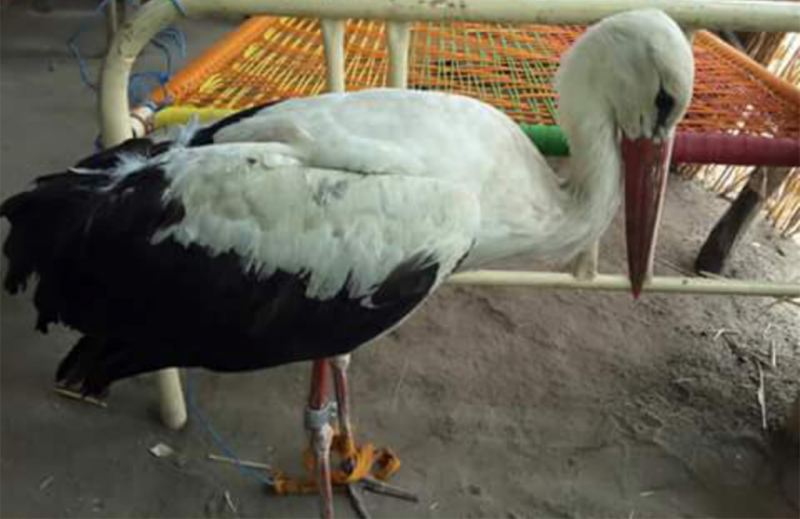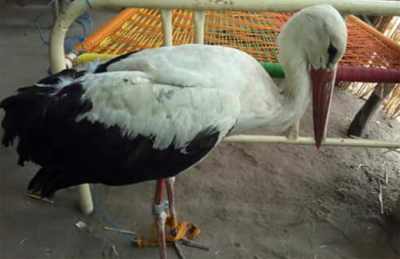Are migratory birds smarter than "hunters," considering that the latter differ from sustainable hunters who know what birds they are allowed to hunt and what they are not? Perhaps the answer lies in Spain, where groups of storks have chosen to shorten their seasonal migration in favor of warmer weather - their desired destination - and win ready meals just like humans who now prefer burgers over "molokhia." The result is that humans, who terrified the groups that land in the green oases along their migration route from Europe to Africa and then back, have contributed to changing migration patterns, knowing that these birds provide services to farmers by exterminating insects, reptiles, and locusts that threaten their crops.
What about the numbers? The Arab region, including Lebanon, as well as the Red Sea, serves as a natural passage for storks during their summer migration from Africa towards Europe, ranking as the second most important migratory route for millions of birds worldwide. This is because the stork species (of which there are 17) requires thermal currents during migration that are absent over the Mediterranean Sea.
In the latest studies regarding migratory birds, a survey conducted in 2020 revealed that about 70% of stork populations have canceled their migration plans and opted to settle in European countries. Meanwhile, the “World Bird Protection Council” estimates that between 1.7 to 4.6 million birds — from at least 413 species — are killed annually, especially in Saudi Arabia, Iran, Iraq, Lebanon, Egypt, and Yemen. To clarify, storks are not classified internationally as game but rather as protected birds under the Convention on the Conservation of Migratory Species of Wild Animals (CMS), to which most countries are parties.
**Lebanon: The “Hospitable” and the “Killer”**
In 2004, Lebanon approved a hunting law that regulates the relationship between hunters and game while protecting biodiversity and birds and animals. This was followed by the establishment of the Higher Council for Game, under which the Minister of Environment is tasked with determining the opening and closing dates of the hunting season and game, organizing hunting licenses, requiring an exam in special clubs, and determining penalties for violators while giving authority to Internal Security Forces, forest rangers, and conservation guards.
Adonis Khateeb, the head of the Middle East Center for Sustainable Hunting and field coordinator of the Nature Protection Association in Lebanon, criticizes the decision to extend the hunting ban in Lebanon, explaining: "This procedure disconnects the line of communication between responsible hunters and the ministry's role in regulating the sector." He continues: "When responsible hunters are prevented from being on the ground, it leaves the field open to poachers who boast about their empty displays on social media, endangering nature." He points out: "Lebanon is the second most important migratory passage for birds in the world after the North and South American routes."
**What’s the Solution?**
Khateeb asserts that the hunting season must be opened because sustainable hunters are responsible partners in protecting nature. He outlines the steps: "In collaboration with the Committee for the Protection of Migratory Birds (CABS), we seek to form responsible hunting groups and organize awareness-raising courses and develop sustainable hunters, especially in Akkar and the Western Beqaa."
Hassan Salman, president of the Union of Game Hunting Groups in Lebanon, disagrees with the idea that storks are threatened by hunters. He says: "The bigger threat comes from agricultural development in terms of herbicide and pesticide use, which affects their lives and fertility. It is true that their numbers decreased in the past, but they are now reproducing and safe. Out of 200,000 hunters, only about 500 violate the law."
Salman denies that killing 500 storks threatens biodiversity, explaining: "This bird reproduces in populations of around 60,000, and the number of birds killed during migration is kept under control. However, the issue is moral: why kill when they are not consumed? The issue here is not environmental but is recorded as a hunting law violation."
He appreciates the role of the hunting groups under the union, which consists of 35 groups and around 200,000 followers, stating: "As part of awareness campaigns, active environmental groups are working to promote the idea of observing and photographing birds during their migratory journey instead of hunting them. We need to spread awareness of this bird's role in the ecosystem and the concept of sustainability as it reflects on humans’ quality of life, especially since there are areas called bottlenecks in Lebanon that attract hunters as passages for birds. Here lies the quandary that Lebanon's area is small and the number of hunters is large, meaning it is unsafe to restrict them to specific hunting areas."
Saying that they are satisfied with the current situation, Salman remarks: "We are pleased with the numbers, the security forces, and associations regarding awareness and enjoying the passage of these birds, and it remains upon the Ministry of Environment not to evade its responsibilities in the hunting sector."
**CABS**
The Committee for the Protection of Migratory Birds (CABS) confirms that with the onset of the spring migratory season and the passage of storks, pelicans, raptors, and other protected species over Lebanon, they have begun setting up protection camps on Lebanese territory in collaboration with the Nature Protection Association in Lebanon, the Anti-Poaching Unit, municipalities, and security forces to prevent massacres against these birds.
Nonetheless, the committee expresses regret over the videos it receives, noting that many of these birds have perished before rescue teams could treat them. They clarify: "Our semi-annual campaigns against poaching in Lebanon began in 2017 and have made positive progress, especially concerning awareness and biodiversity protection throughout the country. Despite these efforts, hundreds of birds continue to fall in forests and fields due to hunting, including a bird bearing a Roman ring that had to be euthanized due to severe injuries."
**The Habitat**
While storks are hunted along the African-Eurasian flight path, Lebanon ceremoniously celebrates by issuing stamps featuring the stork, which is considered an "icon" of birds, as forest armed groups search for game. Meanwhile, Polish rural areas experience a unique phenomenon where the number of storks in summer exceeds the local population, with residents believing that these birds bring luck, tourists, and children according to old Polish legends. Thus, they build special houses and nests for them on their roofs and surrounding areas near swamps for these birds to lay their eggs, knowing that Poland hosts around 20% of the world's total stork populations.




